Last-Minute NYC Holiday Gift Guide 🎁
We’ve created a holiday gift guide with presents for the intrepid New Yorker that should arrive just in time—


There are 196 listed parks in Manhattan on the New York City Parks Department website, a compilation they admit is “not entirely exhaustive.” We went through the whole Manhattan list to highlight the 10 smallest parks in the borough. While they may be small in size, each has a rich history. Of note, the Parks Department list of parks include triangles, malls, playgrounds, dog runs, and some buildings, like public pools, The Public Theater, Merchant’s House Museum. Here, from a space barely large enough to fit two people to triangles honoring New York City residents are the 10 smallest parks by acreage in Manhattan:
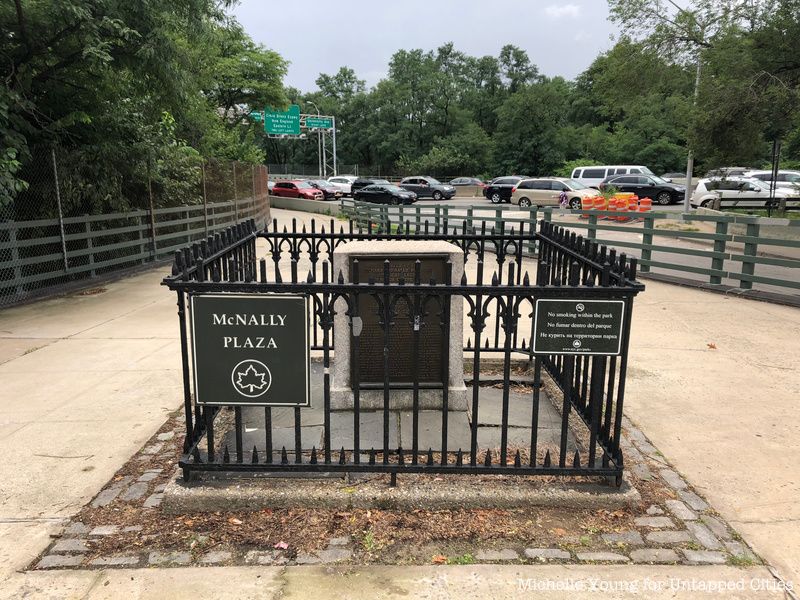
McNally Plaza is so small, it doesn’t even have a size listed, unlike most of the other parks on the Parks Department website. The plaza consists of a stone marker surrounded by a gate, situated in Washington Heights on a small sliver of land just off the entrance ramp to the Washington Bridge that crosses the Harlem River.
The park is named for Richard J. McNally, a Washington Heights resident who lived at 392 Fort Washington Avenue. He served as a corporal in World War I in Company M of the 107th Infantry and was killed on September 29th, 1918. The honorary marker was placed by the Richard J. McNally Post 263 of the American Legion, and is for all those who “gave their lives for their country in the World War and who at the time of their enlistment resided in the territory covered by this post.”
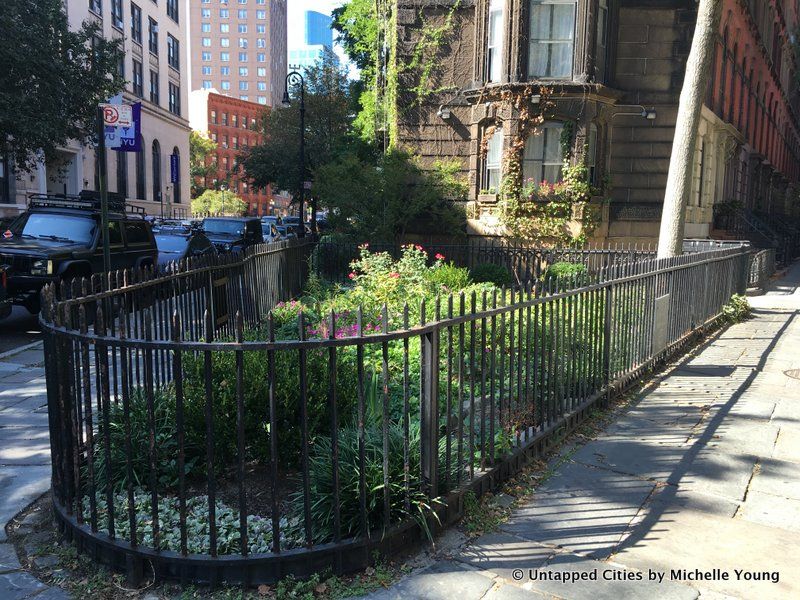
The Abe Lebewohl Triangle is located at the intersection of 10th Street and Stuyvesant Street, one of the few diagonal streets in Manhattan. The 0.01 acre triangle is also situated across the street from the Church of St. Mark’s in the Bowery, the oldest site of continuous worship in New York City.
Abe Lebewohl was an immigrant from the Ukraine, arriving to American in 1950 after escaping Soviet rule. His father had been exiled to Siberia, while Abe and his mother were banished to Kazakhstan. The family managed to reunite and entered Poland through western Ukraine, then to Austria, and then an Italian refugee camp where they spent five years before heading to the United States. Lebewohl was a beloved member of the community, the proprietor of the Second Avenue Deli, who according to the Parks Department “drew loyal customers from celebrities, tourists and locals alike with his Jewish culinary delicacies and generous and magnetic spirit.”
Lebewohl died in 1996, the victim of a robbery that remains unsolved today. The Abe Lebewohl park, which is just in front of the church, is about 16 times as large as the triangle.
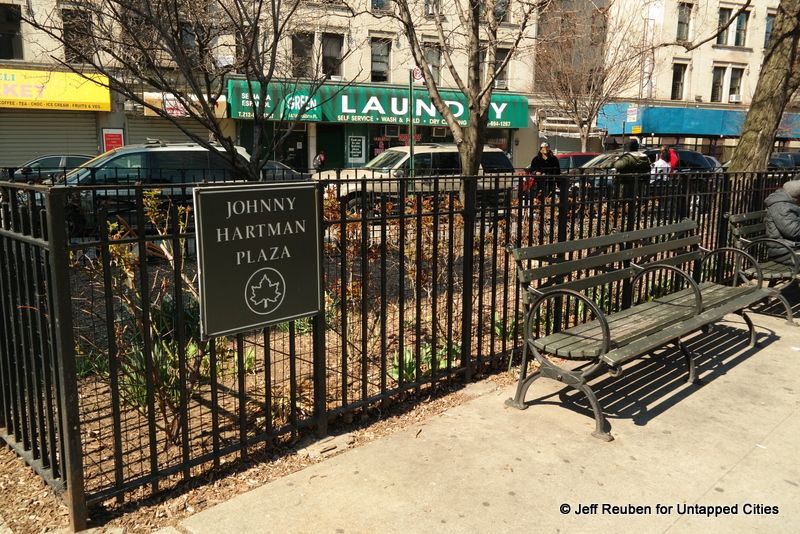
Johnny Hartman Square is a 0.02 acres sliver on a Flatiron-shaped island in Hamilton Heights at the intersection of Amsterdam Avenue, Hamilton Place and 143rd Street. Hartman was a World War II veteran and a celebrated jazz singer who recorded with Dizzy Gillespie, Errol Garner, and John Coltrane, with whom he recorded eight albums. Originally called Hamilton Square, for Alexander Hamilton, whose relocated home Hamilton Grange is just a few blocks away, the square was renamed Johnny Hartman Square in 1984.

Bartholdi’s Lafayette and Washington next to Morningside Park
Lafayette Square is named after the Marquis de Lafayette, the French nobleman who sailed to America at age 19 as a volunteer soldier and became the youngest general in George Washington’s army. Lafayette Square, like Johnny Hartman Square, was acquired by the NYC Parks Department through condemnation of the land and in this case, as part of the acquisition for Morningside Park. This pocket park is all the more notable for the sculpture, a replica of an original piece “Lafayette and Washington” located in Paris by Frederic-Auguste Bartholdi, the sculptor of the Statue of Liberty.
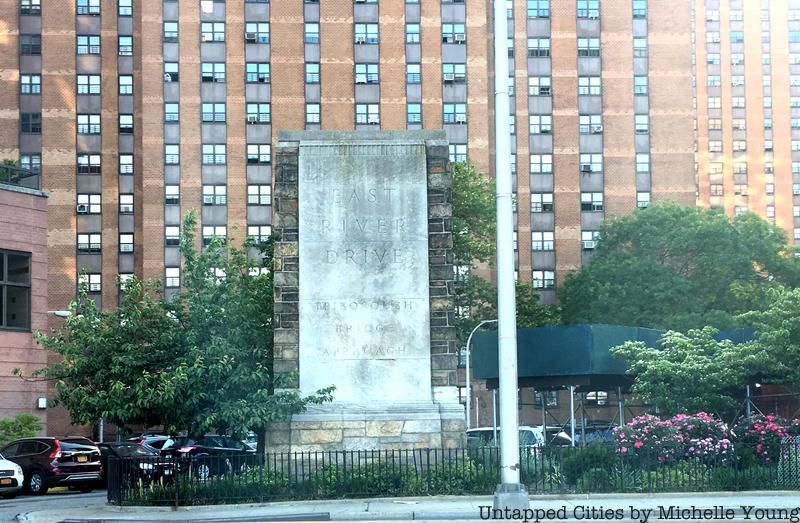
On the Upper East Side, there’s a park with no name at the intersection of the FDR Drive and 93rd Street. While the NYC Parks Department website has no description about the park, you can see in the above Google Street View image that there’s a stone marker that says East River Drive Triborough Bridge Approach.
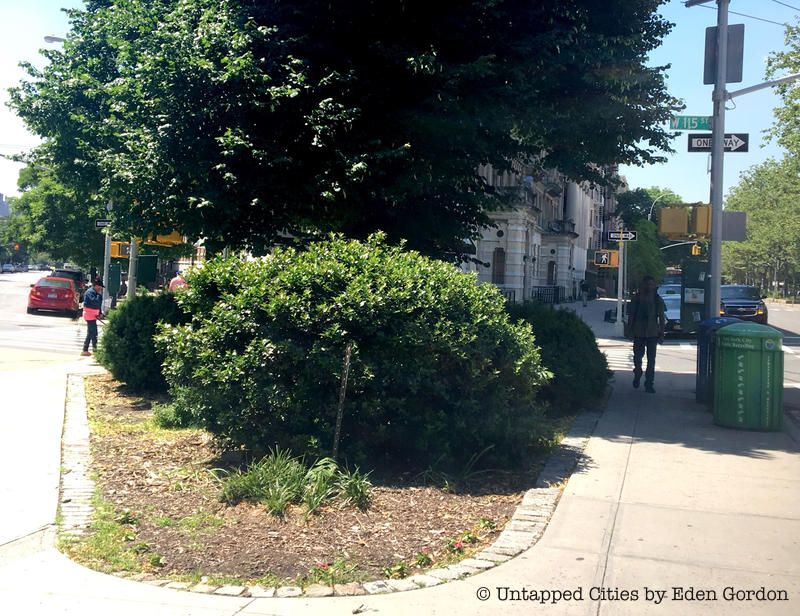
Samuel Marx Triangle is located in Harlem at the intersection of 115th Street, St. Nicholas Avenue and Adam Clayton Powell Boulevard. Unlike many of the city’s triangle parks, Samuel Marx Triangle has four benches for pedestrians, shaded by a Littleleaf linden tree. Samuel Marx was born in Manhattan and was a noted auctioneer, and later an educator. He was a member of the Board of Alderman and was elected to Congress, but died before his term began. NYC Parks Department notes “Samuel Marx was respected and loved by many. In 1923, the Board of Aldermen named the triangle after him, shortly after his death, noting that ‘in his loss the city of his birth and pride is poorer by one outstanding member.'” The Samuel Marx Triangle is located three blocks from where he lived.
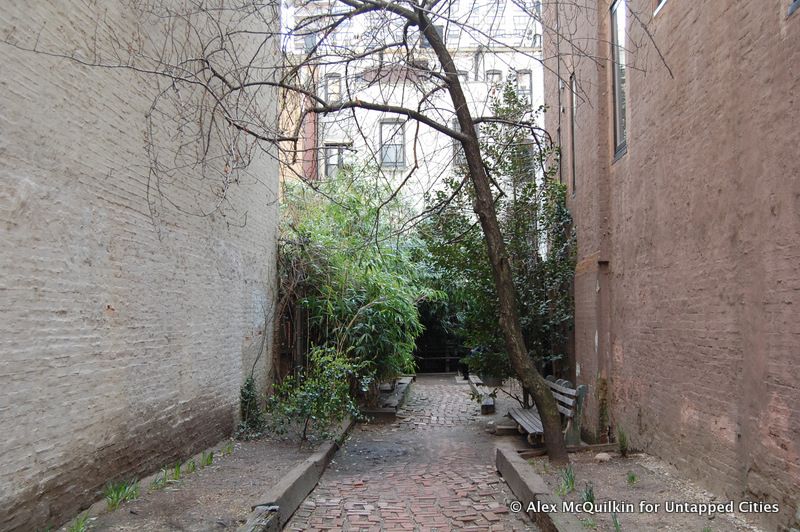
At 256 West 71st Street is the park Septuagesimo Uno (meaning 71 in Latin), which is often cited as New York City’s smallest park. As you can see from this list, it’s not quite – although compared to many of the other parks on this list it is more “park-like” than the rest, secluded between two brownstones with some benches.
Septuagesimo Uno was acquired by the city through condemnation on March 28, 1969, near the height of the city’s budget woes. But the park wasn’t officially opened by the parks department until May 1981 (probably because of aforementioned budget woes). In 2000, the park benefitted from a $14,000 restoration project that, among other things, contributed the gates that now help enforce the park’s opening hours. The same year, the park got its current name, a Latin-ization of its former bland, but perhaps more fitting name: “71st Street Plot.”

Charlton Plaza is named after Dr. John Charlton, an English surgeon who became president of the Medical Society of the State of New York. He is also the namesake for Charlton Street which borders this plaza, an honor bestowed by Trinity Church. Like the park mentioned before on FDR Drive, until 1996 this spot was simply known as “Park.” Charlton Plaza is located at the on Sixth Avenue between King Street and Charlton Street.
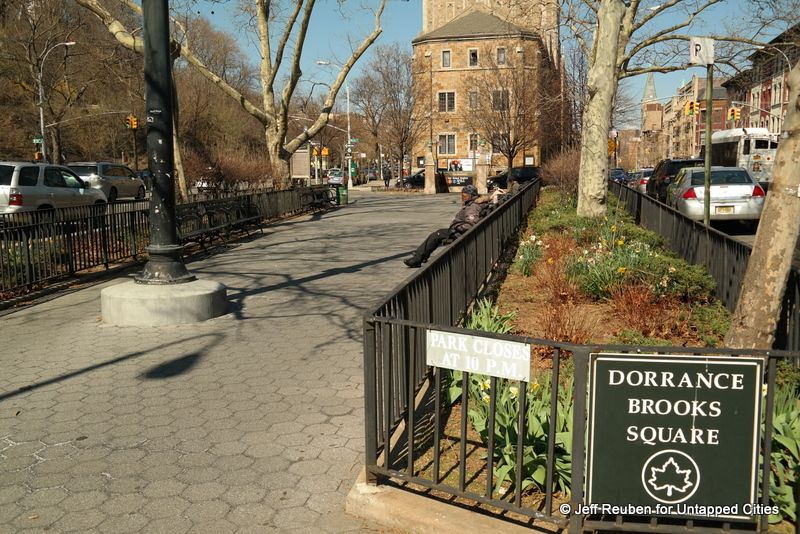
At the intersection of St. Nicholas Avenue and Edgecomb Avenue, between 136th Street and 137th Street is this small square named in honor of a Harlem-born, African American solder who fought in World War I. As the Parks Department describes, “Until 1948 African American soldiers served in segregated divisions, which usually provided only support functions, but the 15th NY Infantry was renamed the 369th United States Infantry and assigned to fight in the French Army’s 161st Division. The black soldiers proved courageous in battle and earned many decorations. Brooks distinguished himself in battle by taking charge of the remnants of his company after the enemy severely reduced their numbers and killed the commanding officers.”
Over 10,000 people celebrated the dedication of this triangle in 1925.
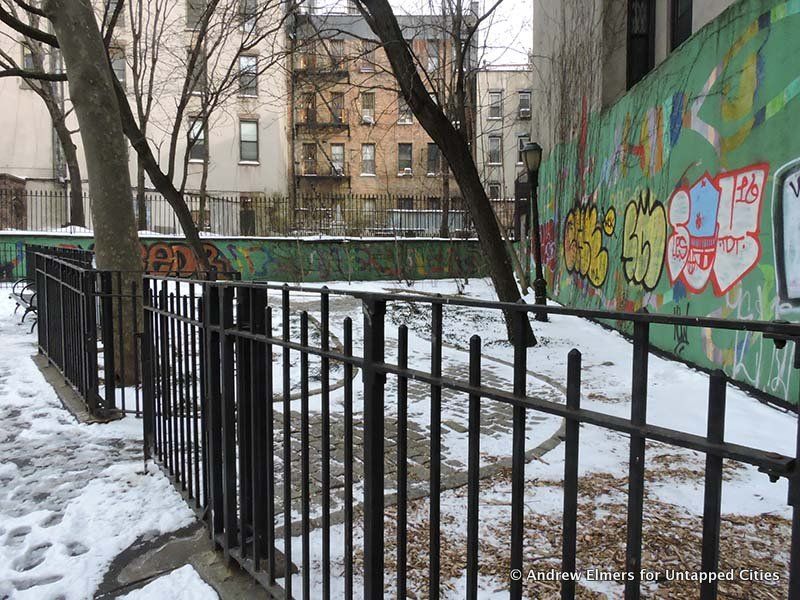
St. James Triangle celebrates the Catholic portion of New York City’s religious history, named after the St. James Roman Catholic Church formed on the Lower East Side in 1836. The parish was known for its care of the poor and ill, tending to quarantined cholera patients, a disease which took the lives of several priests. St. James Triangle is located next to the Spanish and Portuguese Jewish Cemetery, and replaced a parking garage and tenement house. Bernard Baruch, who advised President Woodrow Wilson and Franklin D. Roosevelt, donated the money for this park.
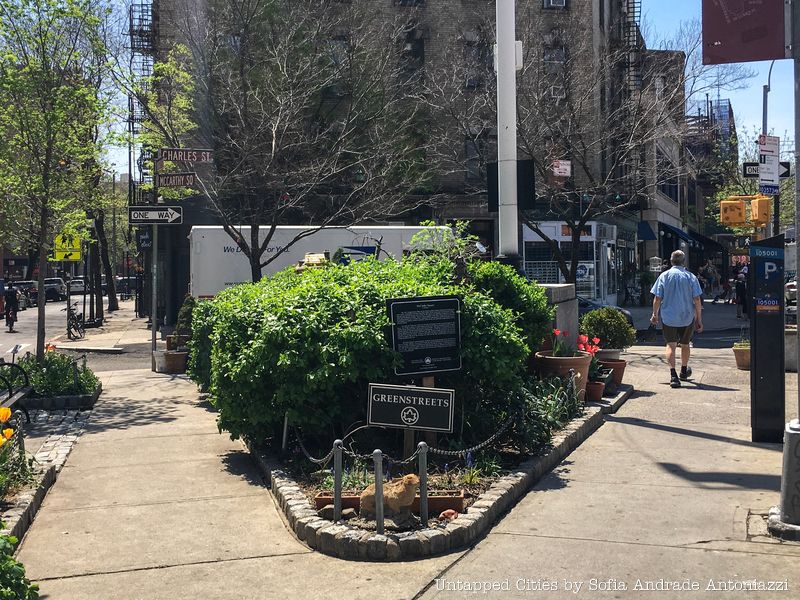
McCarthy Square in Greenwich Village is named after Private First Class Bernard Joseph McCarthy, a Greenwich Village-born resident and Marine who was killed in World War II at Guadalcanal. The plot of land was formed by the extension of Seventh Avenue into Greenwich Village, as part of the 1811 Commissioner’s Plan. McCarthy was the first reported death from Greenwich Village and the flagpole that now stands there was moved here from the 1939 World’s Fair in Flushing.
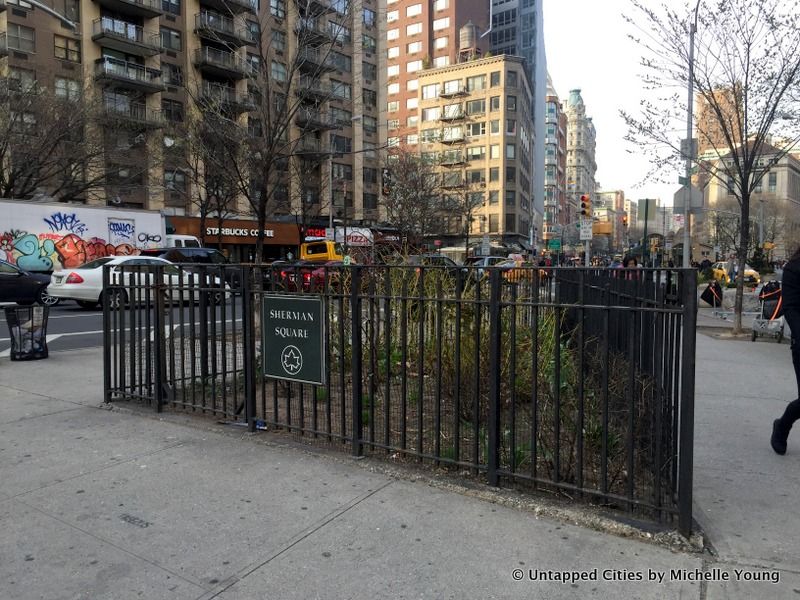
Although Sherman Square is listed on the NYC Parks website at 0.07 acres, larger than the parks on this list, the actually green space is quite miniscule. It’s smaller than Abe Lebewohl triangle, the second to smallest. Located at a traffic triangle on 71st Street formed by the intersection of Broadway and Amsterdam, Sherman Square is just down the street from Septuagesimo Uno.
Next, check out 13 pocket parks in NYC and 10 indoor public spaces in NYC.
Subscribe to our newsletter